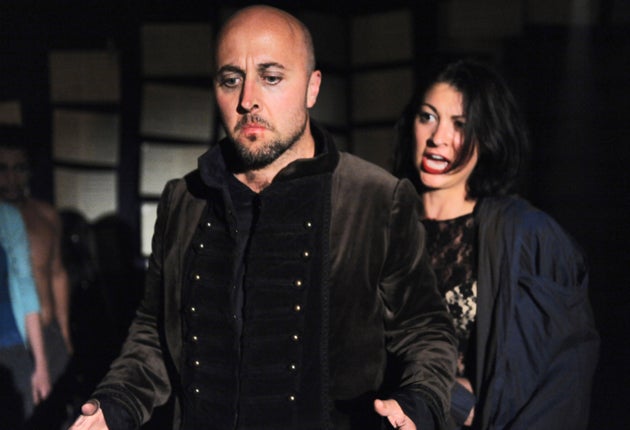The Duchess of Malfi, Great Eastern Quay, London
A ghost train for grown-ups that sets you down feeling bullied and bored

Your support helps us to tell the story
From reproductive rights to climate change to Big Tech, The Independent is on the ground when the story is developing. Whether it's investigating the financials of Elon Musk's pro-Trump PAC or producing our latest documentary, 'The A Word', which shines a light on the American women fighting for reproductive rights, we know how important it is to parse out the facts from the messaging.
At such a critical moment in US history, we need reporters on the ground. Your donation allows us to keep sending journalists to speak to both sides of the story.
The Independent is trusted by Americans across the entire political spectrum. And unlike many other quality news outlets, we choose not to lock Americans out of our reporting and analysis with paywalls. We believe quality journalism should be available to everyone, paid for by those who can afford it.
Your support makes all the difference.English National Opera's weakness for borrowed cool continues in The Duchess of Malfi.
This time, the bringers of cool are the theatre company Punchdrunk, while composer Torsten Rasch supplies an oily orchestral brew of late Berg and early Stockhausen. Cover your face with a white carnival mask and you are free to explore three floors of a disused office block in the boom-bust marshlands of Newham, east London, to touch, smell, spy and eavesdrop as a half-dozen scenes unfold simultaneously, exploding John Webster's narrative until the palsied pageantry of its shrieking climax.
Punchdrunk's compulsory masks serve a dual purpose, turning spectators into cast members and restricting their view. The darkened corridors of the ground floor suggest a place abandoned in terror. In the stairwells, bloodied rags are strewn on the floor. In an empty cell, faeces has been smeared on the wall. Creep up the stairs and the temperature drops. There is a forest fashioned from electric cables, clouds of sheet music suspended mid-air. The graveyard is the coldest place, the chapel the most forbidding. In a side-room, a man weeps over a recording of an infant crying. In another, CCTV monitors trace the mechanistic rituals of an abbatoir. Should you wish to hear Rasch's music in sequence, follow conductor Stephen Higgins to the vast four-poster where bloated Ferdinand (Andrew Watts) wrestles sweatily with his sister (Claudia Huckle), or watch the Cardinal's mistress (Julia Sporsén) toy with the long blonde hair of a compliant clarinettist.
Compliance is essential to the Punchdrunk anti-narrative format. More so, I suspect, than involvement in the emotions of the characters, as opposed to one's own. Not every door in Felix Barrett's installations of wardrobes, suitcases, computer monitors and medical samples is open to the public. The black-masked company members may not give out directions but will block your way. Hence I stumbled into brightly lit, fully functional urinals several times too often before Barrett's David-McVicar-to-the-power-of-10 finale. As to the drinks bar that is part of the show, I never found it.
Atavistic fears are not enough to sustain a three-hour promenade. Leaving Newham feeling bullied and bored, I'd guess that I heard three-quarters of Rasch's score (confident, conventional, a little didactic in its 60wpm vocal lines).
It's impossible to fault performers who give so much of themselves at such close range. But Duchess lacks the emotional and intellectual punch of Graham Vick's site-specific productions in Birmingham's broken factories and banks, and Rasch is not a figure to match Monteverdi, Beethoven, Verdi, Mozart or Berg. Punchdrunk may have boosted ENO's box office, but Birmingham Opera Company is a better model for expanding and stretching an audience than this ghost train for grown-ups.
Finally, Sir Charles Mackerras, who died last week at the age of 84, will be greatly mourned. His was not a jet-set career but one of unstoppable revolution and lasting substance, from the first flowerings of historically informed Handel to the startling textures of his recent Brahms. There were no extraneous gestures when he conducted, just tough-minded music-making of the highest sophistication and the deepest sincerity. Were the memories of his Dvorak, Beethoven, Britten and Mozart not enough, his spirit lives on in every note of Janacek, whose operas Mackerras championed from the late 1940s. To have heard, watched and learnt from him was an honour.
Next Week:
Anna Picard brushes away a furtive tear as Blackheath Community Opera brings Donizetti's Elixir of Love to the suburbs of south London
Join our commenting forum
Join thought-provoking conversations, follow other Independent readers and see their replies
Comments